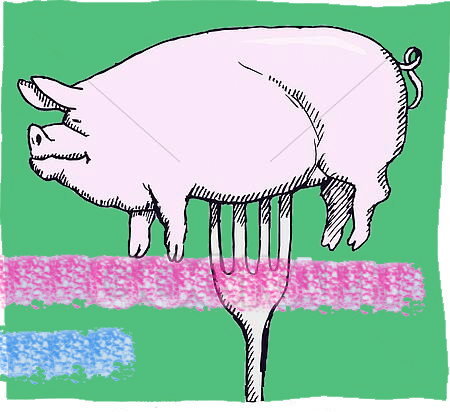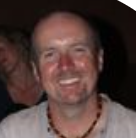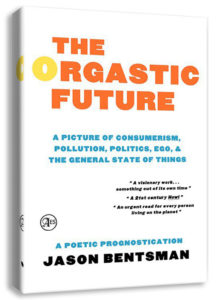
|
A thoughtful, informed reflection by inveterate world traveler and intentional community proponent Martin Dixon-Tyrer on what the pandemic has momentarily revealed to our blinded perceptions, unearthed both of the noble and base, and may bode for the future.
“A frozen moment when everyone sees what’s on the end of every fork” |
California, 1999. I’m in bed, 23 floors up in a generic business hotel, trying to get ahead of the jet lag I know is coming, having stepped off a plane from Europe just a few hours earlier. Drifting in and out of sleep I feel the floor rumble as a large truck goes by. The rumble continues, and in the fog of jet lag I suddenly realise I’m nowhere near a major road nor am I on the ground floor. Earthquake! I bolt out of bed, the floor moving, rumbling, swaying for another 20 or 30 seconds. I hear a woman screaming somewhere, loud enough to make it through the sonic insulation of this airport hotel. Then it is over. I dress and go to the lobby, joining every other guest in the hotel, all of us safe and unharmed but shaken, definitely shaken.
For days afterwards what I’m walking on doesn’t feel so solid and certain anymore. It feels contingent, it could move at any moment. With time this feeling passes. (Everything passes with time, except those things that don’t).
Since then I’ve lived in Lima, a place where earthquakes happen with startling regularity. I’m no longer affected emotionally… they are just a fact of life. Living in an apartment building designed to withstand earthquakes helps, but then any building that stays standing in Lima for a few years is by definition safe in most earthquakes. Still, I never forget that the ground can move.
The coronavirus pandemic feels similar. The realisation, as with a first earthquake, that this doesn’t fit within the parameters of anyone’s everyday life. There’s a strange feeling that things will never be quite the same again, an awareness that the world can go into suspended animation and you’ll be sheltering-in-place wherever you happened to be when the music stopped.
The lovely nomadic life I’ve lived for the last few decades is not coming back in anything like its previous form. That old certainty that a first world passport means you can leave from wherever on a whim and go somewhere else is over. A distant blue horizon viewed from the deck of a sailboat midway across an ocean isn’t so inspirational if you’re worrying about whether you’ll be turned away when you arrive. I feel sad about that—it was a beautiful privilege. I also recognize that what I’m describing doesn’t come close to the genuine terror of a refugee’s experience, and that most of the world’s population never had the luxury of visa-free travel and an easy welcome anyway.
Things that seemed so solid for many, things like jobs, retirement plans, the economy, have in a matter of weeks turned out to not be so. For others less fortunate their anxiety about economic insecurity has proven correct. The froth on the economy in the west has been blown away with a single gust from a virus. It feels like that ‘frozen moment when everyone sees what is on the end of every fork’, as WiIliam Burroughs said of Naked Lunch.
“All that is solid melts into air, all that is holy is profaned, and man is at last compelled to face with sober senses his real conditions of life, and his relations with his kind.”
–Karl Marx
Half a century before Burroughs’ masterpiece something else was stirring. In a radical cabaret improbably located in Zurich the Dada movement began. It was a reaction to the insanity of the First World War—a war that was the consequence of industrialization, imperialism, nationalism, and the absurd posturing of men with big egos in charge of powerful states. (So nothing like today then…) Dada’s aim, in the words of Hans Arp, was to create “an elemental art to cure people from the madness of the age”. While it’s true that his ambition was not fully realised, one might reasonably say that much of the evolution of 20th century critical thinking flows from the seeds that Dada planted. For the 21st century we too need our version of Dada with the ambition to cure people from the madness of this age.
Some of that madness, partially obscured from view by money and social normativity, has been starkly revealed during this pandemic. Let’s start with the cacophony around coronavirus. In case you missed it, Bill Gates has a plan for world domination, to be achieved by injecting microchips into our bloodstreams through mandatory vaccinations. The World Health Organization is encouraging governments to break into people’s homes and abduct children. The virus is a hoax, and the symptoms are the effect of electromagnetic radiation from 5G phone masts, which can be cured with turmeric tea or frog venom or injecting bleach. The virus was fabricated in a lab in Canada, released in China in a controlled way (they already have a secret vaccine, don’t you know) then sprung onto an unsuspecting wider world allowing the Chinese to take over western companies at bargain basement prices.
It would be easy to see boundless idiocy as the order of the day, and sometimes the internet feels like a postmodern Tower of Babel—people bellowing at each other in incoherent languages, devoid of logic and credibility. But really it’s just noise, the Gilbert and Sullivan of discourse reborn as the thrash metal of the alt right and the clanging bells of new age woo woo. There is plenty of good analysis out there, serious and thoughtful, but you’re unlikely to come across it if ‘doing your own research’ means watching YouTube videos.
Of more tangible concern than the carnival of confusion is a dumbed down libertarianism, a vapid individualism, that asks only “what is best for me”, or in the more magnanimous version, “me and my nuclear family”. That virus has been infecting us for more than 40 years, Margaret Thatcher’s words still hanging in the air like droplets from a malignant cough: “There’s no such thing as society. There are individual men and women and there are families.” Sadly, for some, the pandemic confirms and reinforces the premise, a vicious cycle of unenlightened self interest.
It’s notable that gun sales spiked upwards as the pandemic became real for Americans. This cult of individualism and the nuclear family is most advanced there, and the self fulfilling prophecy that others will act aggressively in their own interest naturally leads to a need to defend one’s own individual turf (well, one’s stockpile of toilet paper and pasta anyway). Social trust dissolves further as the castle walls around the nuclear family are built ever higher. It’s hard to avoid seeing the consequences of this ‘what’s best for me’ behaviour—even the absurdity of hoarding toilet paper can easily be turned into a lesson of ‘do whatever is necessary to ensure comfort for yourself / your nuclear family first’. Because, without toilet paper, western civilisation collapses…
Then there’s the personal version of the philosophy of Disaster Capitalism (brilliantly exposed by Naomi Klein), where a crisis is seen as an opportunity to exploit and profit, garnering benefits for a few at the expense of many. Governmental actions to mitigate the impact of the pandemic could be seen as an example of care for all, but often they are received without a sense of communal obligation. It’s just a win for the individual, rather like Ayn Rand gleefully grabbing state healthcare in her later years having railed against it for most of her life.
While we’re on the subject of boundless idiocy and selfishness, reality has demonstrated conclusively that Rand’s Atlas Shrugged was, as many of us suspected, a badly written dystopian fantasy rather than a coherent philosophy (if you haven’t read it, don’t bother—it’s a dreadful novel). The strike by the ‘productive leaders’ bringing the economy to a standstill looks laughable now. Does anyone doubt that the economy craters when ordinary people, despised by Rand as ‘looters’, stop working? Would the reality of everyday life really be worse if most investment bankers and hedge fund managers, tax accountants and management consultants, marketing executives and stock analysts, and so on, went on strike? (Having done a couple of those jobs I can say with confidence: no, it would not be).
And yet…
In neoliberal-infected Britain over 750,000 people have volunteered to help during the pandemic. I watched this happen from news reports, open mouthed with disbelief, grateful for this beautiful demonstration that, notwithstanding decades of neoliberal indoctrination, not all hope is lost. People on the island, at least a good number of them, are not quite as utterly self absorbed as the sum of their other actions suggests. The seeds of mutual assistance lay there dormant, just waiting for the right moment to bloom.
Is this a green shoot of community breaking through the toxic sludge? Perhaps people will start looking to each other for help, and perhaps they will continue after the virus passes… repairing something for a neighbour, helping in the garden and sharing produce, shopping and cooking for each other, looking after the kids and the elderly. Exactly the kind of mutual aid that Kropotkin documented as an antidote to the cruelty of social Darwinism, that ‘war of all against all’ imagined by Hobbes.
Rebecca Solnit, chronicler extraordinaire of communities that arise after disasters, would not be surprised. She documents dozens of examples of communities that sprang up after disasters like Hurricane Katrina, the 1985 Mexico City earthquake, and the World Trade Centre attack in 2001. More recently, self-organised communities appeared in Greece during the Eurogroup’s brutal fiscal waterboarding of the country. It seems that, the concerted efforts of market fundamentalism and neoliberalism to change this notwithstanding, we are indeed cooperative and altruistic in our core.
Emissions are down, oil consumption is massively down, the skies and rivers are clearer, more birdsong can be heard. Probably, the rate at which we’re making other creatures extinct is lower. People seem to want to walk in parks and in nature more. City centres are being partially pedestrianised. Gratuitous air travel has more or less stopped. People are cooking more at home, noticing ingredients and thinking about what they are eating, adding more love into food. At a macro level people are working much less… and to some extent state distribution of money is enabling life to continue. The idea that we cannot change the economy substantially, that the only way the world can possibly work is through unfettered capitalism, that ‘There Is No Alternative’, has been shattered like an egg… and the pieces will never fit back together again. (It’s also worth noting for future reference that it didn’t take much to shatter that egg.)
So, while the path leading here is not one to be celebrated, certainly not one that we would have chosen, we are where we are. We have space to reflect, and consider whether we wish to return unchanged to the state of affairs that existed a few months ago. Just like after an earthquake there’s a desire for this to end, for it to be nothing more than a bad dream, to go back to what was, to replicate the prior status quo, maybe tinkering around at the margins a little. But there is also a possibility to go deeper, to evaluate our lives, to ponder on individual and collective values, to be radical in the sense of the original Latin, radix, root. And that feels inspiring.
I certainly don’t have a crystal ball to see the future, and I don’t think anyone does at the moment. However, some threads are becoming clearer. It seems unlikely that travel will return to previous levels for business as virtual conferencing, now trialled extensively through necessity, is so much more efficient. Tourism is going to take a long time to recover to previous levels, if it ever does. More services are going to be provided virtually, for example a consultation with a doctor utilising some basic medical technology at home or at a local centre. This will thankfully increase access to medical services for poorer populations. Online shopping will increasingly replace retail shopping, reducing the number of people required to work in dull jobs just to survive. All of that feels good. On the other hand, what happens to economic inequality? And to human social interaction? In a year will we still be a bit wary of each other, hesitant to get too close to others in public spaces, rarely hugging or touching? How will dating work? Will we become even colder and more isolated, those who can retreating into the nuclear family? That doesn’t feel so good.
“Don’t speak too soon, for the wheel’s still in spin… the order is rapidly fading”
–Bob Dylan, 1963
I feel that the pieces have not yet fallen to the ground, and that there won’t be a single all-encompassing model coming out of this time. Milton Friedman, dark prince of neoliberalism, once said “Only a crisis—actual or perceived—produces real change. When that crisis occurs, the actions that are taken depend on the ideas that are lying around. That, I believe, is our basic function: to develop alternatives to existing policies, to keep them alive and available until the politically impossible becomes the politically inevitable.” On that, at least, he was right.
One pole that some could move towards is community, love, mutual aid… simplifying our lives and helping each other to live well. Another pole is building a bigger wall, excluding others, looking after ourselves, whether that be at a country level, a family level, or an individual level. There’s also a question of whether we restart the insane focus on economic growth and consequent environmental degradation, or live in much greater harmony with the planet and with each other. Whether we try to recreate last year’s norm of extractive casino-capitalism fuelled by empty consumerism and unrelenting competition, or whether we try living cooperatively, testing out Universal Basic Income, sustainable agriculture, and degrowth. The ideas are out there—documented, thought through, explored.
“People make their own histories, but not in circumstances of their own choosing”
–Karl Marx
Individually we are all historical actors, relevant and valid, our every action inescapably contributing to the reality we live within. Collectively, too, we are historical actors, stronger than the sum of individuals. This can be our moment, a point of inflection, a fulcrum for change.
Like the Carnation Revolution of 1974 in Portugal, and the fall of the Berlin Wall in 1989, change can happen peacefully, and acting out a more beautiful world brings that world into being. Tangibly, practically, if we act with each other as we desire the world to be we are literally making it the way the world is. And if we keep doing it that’s the way the world stays.
Writing this at my friend Naomi’s beautiful farmhouse in Portugal I can’t help but ponder on the Carnation Revolution and the sense of possibility and hope that it turned into reality. Sophia de Mello Breyner Andresen, a Portuguese poet, captured it so well:
This is the dawn I waited for
The new day clean and whole
When we emerge from night and silence
To freely inhabit the substance of time.
It’s up to us, each of us individually, each of us collectively. The choice is in our hands.
— About the essayist, Martin Dixon-Tyrer





Leave a Reply